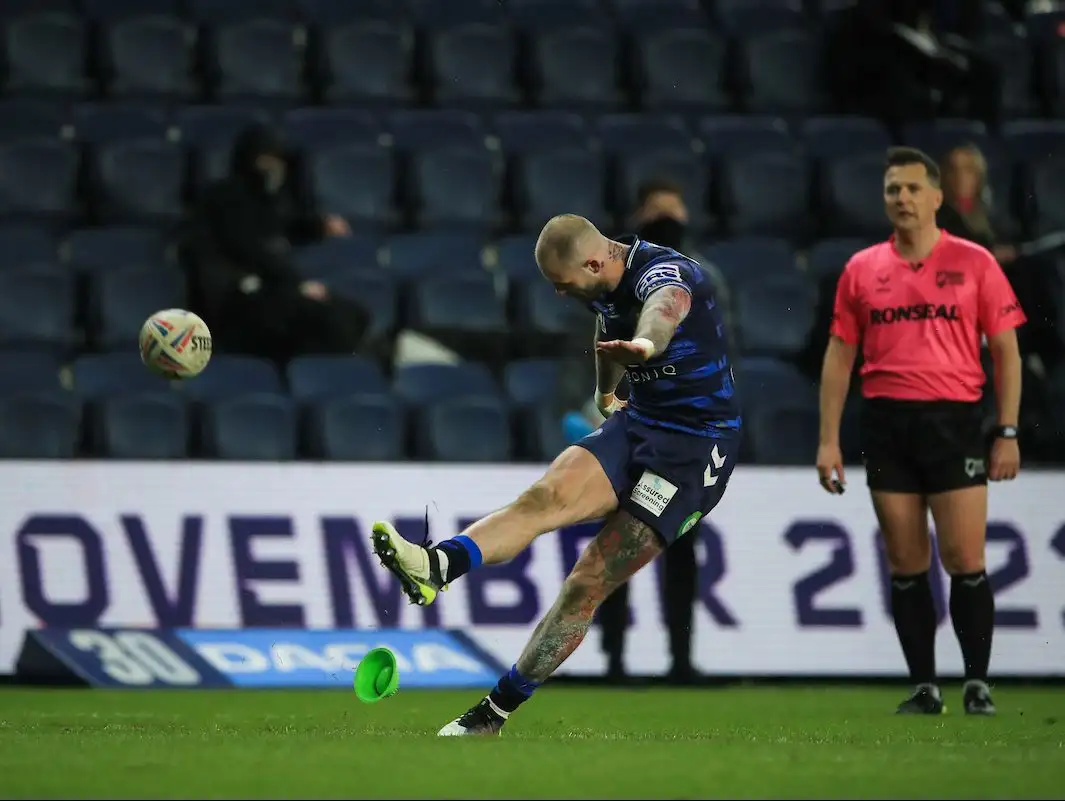Ref view: Explaining set restart and a 50% reduction in penalties

Zak Hardaker (3) of Wigan Warriors converts his sides try
Former top level referee Ian Smith says the new set restart rule should see a dramatic reduction in the number of penalties, especially at goal.
In a new regular feature on Love Rugby League, we will get insight surrounding the major talking points over decisions and interpretations of laws every weekend.
The opening night of Super League in 2021 saw St Helens score the first try, first conversion, first penalty goal and first drop goal of the new campaign; the penalty coming after opponents Salford were penalised for offside.
The first try of 2021 #SuperLeague…
It goes to @Saints1890 & Tommy Makinson live on @SkySportsRL 🔥 #SuperLeague #SLStHSal pic.twitter.com/fmtPWvtnoJ
— Betfred Super League (@SuperLeague) March 26, 2021
In that instance, a Salford player had picked up the ball from in front of a team-mate who had knocked on.
The set restart, or so-called “six-again” rule, was introduced when Super League re-started following the initial coronavirus lockdown last year.
Smith explains: “It becomes a penalty, rather than a set restart, if the ball isn’t brought back in to play properly.
“So if the ball comes out through interference or a ball steal, then it’s a penalty.
“But if the play the ball is simply slowed down and played correctly, then it’s a set restart.
“The main difference between our game and the NRL is that offsides or markers not square is a set restart in the NRL, but remains a standard penalty in our game.”
REPORT: St Helens 29-6 Salford: Champions kick-off new Super League season with win
There were some questions about whether clubs would prefer to have a penalty shot at goal for an infringement, particularly within 20 metres of the goal post, rather than a set restart.
But that’s not an option, and players cannot appeal to have a set restart converted to a penalty either.
Smith added: “It defeats the object of keeping the game flowing.
“Penalties, especially at goal, should reduce by at least 50%.”
REPORT: Leigh 18-20 Wigan: Brave newcomers denied by Wigan comeback
How the RFL explain the rule
For an infringement of Section 11 (10)(a) of the International Laws of the Game “The tackled player shall be immediately released and shall not be touched until the ball is in play” – the referee now restarts the game by verbally and physically signalling “six again”, rather than awarding a penalty as previously.
“Six again” will be ruled for any defensive ruck infringement that in the past would have resulted in a penalty (e.g. Holding down, hand on the ball, crowding, leg pulls, markers not square , split early or stand too deep).
The referee will signal this in the usual manner for restarting the tackle count – raising a clenched fist above the head, and waving from side to side.
A Buzzer will also sound, to aid in communication with players and others at the ground.